#national day of truth and reconciliation
Text
content warning: residential schools //
as Orange Shirt Day / The National Day of Truth and Reconciliation nears [September 30] I want to give a bit of context to those internationally who might not know that this day is.
Orange Shirt Day was started by Phyllis Webstad and others in 2013. This is a day to reflect and promote reconciliation, as well as uplift and support the victims and communities impacted by the Canadian residential school system. This is also the origin of the Every Child Matters movement.
The National Day of Truth and Reconciliation, as it's known by the Canadian government, was only formed as an official national day in 2021 after 200 unmarked graves were discovered on the property of the former Kamloops indian residential school that same year. Currently there are estimated thousands of graves on residential school properties; many of which have not been properly addressed.
Kivalliq Hall was the last residential school in Canada and closed in 1997. This is not some far-off distant history thing, many people alive today were sent to residential schools as children.
If you want to give support, consider donating to the Indian Residential Schools Survivor Society, or Orange Shirt Day. The IRSSS does fantastic work, offering counselling and numerous support lines - including one for 24/7 crisis support. I'd also like to mention Reconciliation Canada, as they also do good work.
This is a small personal anecdote here, but I'd like to recommend checking out Indian Horse; a novel by the late Richard Wagamese that follows the life of a boy going through the residential school system. There is also a film adaptation by the same name. This book [and its film] offers valuable education on the dark history that is residential schools.
I'm always happy to have additional links and educational material added to my posts, so please do not hesitate to add onto this. thank you.
418 notes
·
View notes
Text
hey just so you know it is the National Day for Truth and Reconciliation in Canada today, September 30th. this day recognizes the tragedy and horror of the "Indian Residential School" system that was active since before 1867, and continued up to 1997. it was focused on removing Indigenous youth from their tribes and communities and assimilating them into the culture of european colonizers, which effectively cut off an entire generation from their people and families, destroying many aspects of Indigenous culture. it was also responsible for the deaths of many Indigenous children, most of which were covered up as much as possible.
September 30th is also called Orange Shirt Day, in honor of Phyllis Webstad. when she was initially taken into a residential school, they confiscated her personal clothing, including a brand new orange shirt, and never returned them. many people choose to wear orange shirts on this day in solidarity of the children that were stolen.
the day is now dedicated to learning about Indigenous cultures, figuring out matters of reconciliation and recompense, minimizing further harm to Indigenous communities, and honoring the lives lost and changed due to this act of genocide.
colonization is very prevalent all over the world, so even if you're not Canadian it likely reflects a similar history in your country, that is one reason why I feel it can benefit people of all nationalities to learn about.
and while reading and learning online is important, nothing can match the experience of talking about it directly to Indigenous people who have gone through these things. their stories and beliefs and experiences are important and incredible to learn about.
144 notes
·
View notes
Text
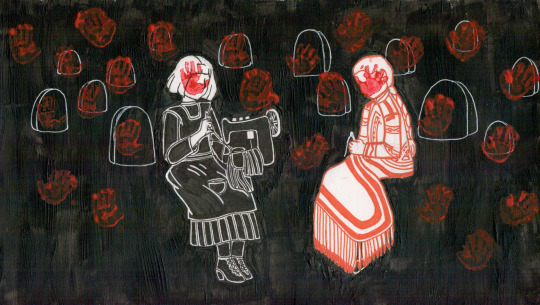
In honour of the lost lives and innocence taken too soon.
#cnanada#united states#indigenous#first nations#orange shirt day#truth and reconciliation#national day of truth and reconciliation#justice#residential schools
127 notes
·
View notes
Text

https://www.canada.ca/en/canadian-heritage/campaigns/national-day-truth-reconciliation.html
Mental health supports available
Former residential school students can call 1-866-925-4419 for emotional crisis referral services and information on other health supports from the Government of Canada.
Indigenous peoples across Canada can also go to The Hope for Wellness Help Line 24 hours a day, 7 days a week for counselling and crisis intervention.
Call the toll-free Help Line at 1-855-242-3310 or connect to the online chat (Please use Google Chrome).
Truth and Reconciliation Week
This bilingual educational program is open to all schools across Canada. All sessions will be held virtually, allowing classroom participation from across the country and the involvement of Indigenous and non-Indigenous students. From September 25-30, 2023, registration is required.
@allthecanadianpolitics
#current events#so called 'Canada'#settler people#National day of Truth and Reconciliation#learn the Truth#go learn a thing#reconciliation is dead#Canadian news#beneficiaries of a genocide#open learning#free resources#settler colonialism#indigenous people#indigenous land#land back
60 notes
·
View notes
Text
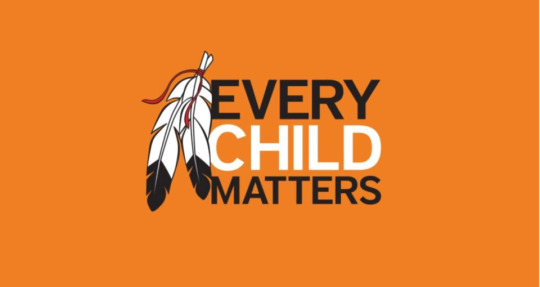
We remember those that never came home and honour those that survived.
#truth and reconciliation#national day of truth and reconciliation#orange shirt day#every child matters#indigenous#Canada#cultural genocide
73 notes
·
View notes
Text
In honour of the National Day of Truth and Reconciliation here in Canada, I would like to share Elisapie's new album Inuktitut, which is a compilation of covers of popular songs in the Inuit language (Inuktitut).
32 notes
·
View notes
Text
I feel deficient in this class. My mother never speaks to me in Inuktitut anymore. Residential schools have beaten the Inuktitut out of this town in the name of progress, in the name of decency. Everyone wanted to move forward. Move forward with God, with money, with white skin and without the shaman's way. It made me wonder what I was not being taught. It made me wonder why the teachings I was receiving felt like sandpaper against my skin. It made me sad to have Inuktitut slip away. It lives under my subconscious just like the secrets of the teacher do.
Tanya Tagaq, Split Tooth
#Tanya Tagaq#Split Tooth#Inuktitut#residential schools#Truth and Reconciliation#National Day of Truth and Reconciliation#regret#loss#Indigenous literature#Inuit literature#quotes#quotes blog#literary quotes#literature quotes#literature#book quotes#Orange Shirt Day
20 notes
·
View notes
Text
Actually I'm going to share this here for Orange Shirt Day.
The National Centre for Truth and Reconciliation did a series of talks this week with guest speakers on experiences, history, stereotypes and biases, and current efforts for action. The live talks were recorded and are on their website here, along with other resources such as books, articles, and films, so I thought I'd pass them around.
(I am NOT indigenous, just sharing a resource. There are many other talks, podcasts and writings not listed here from survivors and elders that I'm sure go much more in depth into these issues. The best thing to do at this point is to listen and learn.)
35 notes
·
View notes
Text
Author's Note: The Indigenous Future
I would be remiss if I did not mention the indigenous elephant in the room within ‘Far Past the Ring’.
As you might have gathered, much of the background of both Medina Station and the three original characters are deep within First Nations/American Indian backgrounds*.
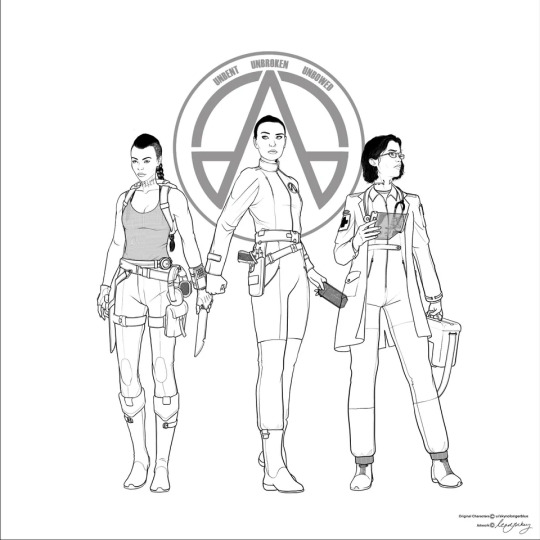
(left to right: Dr. Sjael Drummer, Camina Drummer, and Dr. Tanke Drummer)
I have written both Sjael and Tanke Drummer as being of mixed Ojibwe descent through the Drummer side of their family, as is their cousin, canon Expanse character, Camina Drummer (Cara Gee, her actress, is Ojibwe First Nations, though whether or not Camina is in the show is not confirmed). Additionally, Timon Chapelle, Tanke’s husband, is of mixed-Metis descent as well. More about the land practices of Medina Station and the indigenous heritage it is drawn on can be read in my previous piece on the matter.
While researching for this work, I dug into the local history of the land I live on, which, coincidentally, is the unceded land of the Anishinaabe people. I am a settler, but I take deep pride in the place that I reside. I find it a responsibility as a citizen of my country to do so.
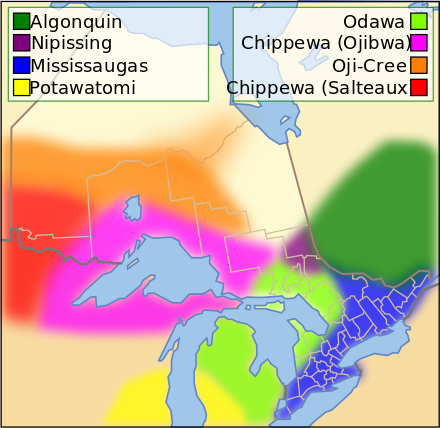
(The region of the various Anishinaabe peoples, taken from Wikipedia. The author is not going to directly tell you where they are personally located)
As you might have guessed, the Kind Man (a form that the Protomolecule has taken in order to communicate with both Omega and James Holden) uses the form of Tanke and Sjael’s deceased father, Dr. Aki Drummer.
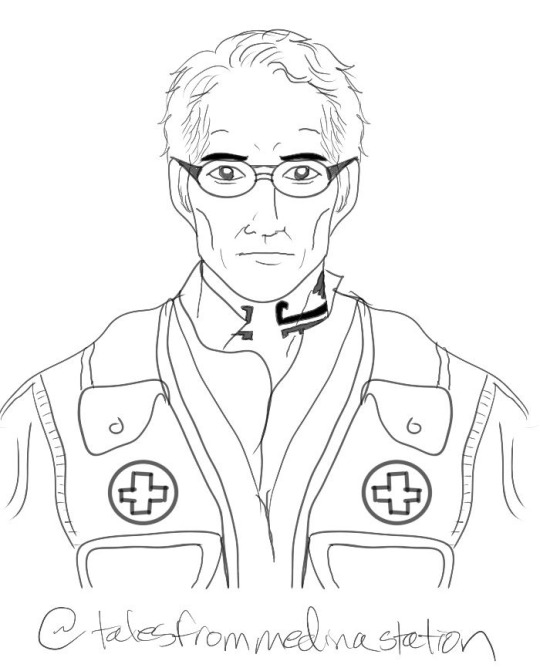
(Image: Dr. Aki Drummer, drawn by the author in a quick sketch)
Aki is a Belter man of Ojibwe descent, who, while his story is not fully explored in this piece, does recall and use his heritage to better understand the nature of the humans that he serves as a physician, and later on, the Protomolecule uses to better understand the humans creating contact with each other from across the stars.
The Kind Man also tells Omega the story of the Legend of the Bluebonnet, which comes from the Comanche tribe of Texas, another American tribe who made the prairies of the United States their home for time immeasurable. The Kind Man mentions that, although he is not Comanche, he understands the story. The tale is a legend of a young girl’s sacrifice to save her prairie home and her people ... .the story that Omega will find herself repeating at the end of ‘Far Past the Ring’.
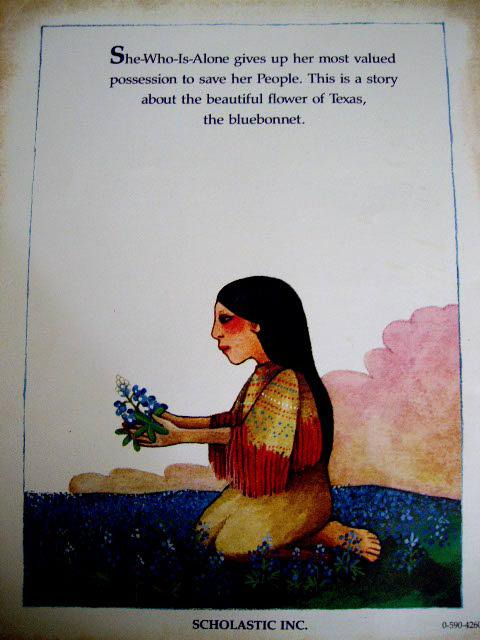
(Image from 'The Legend of the Bluebonnet', by Tomie DiPaola. copyright Puffin Books)
The Kind Man also repeatedly uses a word in Ojibwe, one that, when I heard its meaning from James Vukelich (Ojibwe-Turtle Mountain) made me stop, write it down, and listen to his podcast episode again. I immediately knew this word would become a part of the story.
(If you can, please give his work a listen. He is a wonderful speaker.)
That word is Gidinawendimin, one word that means, ‘we are all related’. Vukelich goes into detail about how it is not only the people, but the animals, earth, water, all of life around us. And I could not help but think–”Holy hell, this is the thesis of the story.”
So, why am I rambling on about all of this?
Because indigeneity has its role in our future, and I tried my best to not only reflect that in this story, but because I staunchly believe in it as well.
The Belters are the people who helped build the solar system in ‘The Expanse’. They worked and lived in space to the point where many of their bodies can not survive normal gravity. Throughout the series, they face issues regarding access to water, air, and so many things that we often take for granted. They are seen as less than human in their own native environment of the Belt, and are often discriminated against by citizens of planets like Earth and Mars.
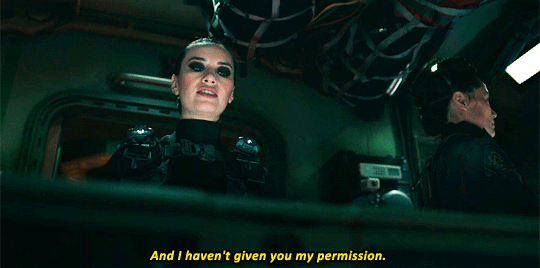
Additionally, in the Star Wars universe, the clones are copies of a man from Mandalore, portrayed by an indigenous actor, and whether or not their indigeneity is canon in the show, I prefer to see it as such.
I want to be under the impression that, like in the real world, the dehumanization of indigenous peoples has irreparable damage to culture and heritage, to say nothing of the social bonds between people.

This is known as intergenerational trauma, and is explained beautifully here in a video from Australia.
Fiction can be a powerful metaphor. In this case, this trauma rings through the clones within the Star Wars universe, and if they survive into greater society, will be a burden that their people will carry. Their descendants. The clones were people bred to serve one purpose, that of violence and war, and expected to be expendable machines, not as humans. They were stripped of culture, family, and heritage, and find themselves broken and lost when their use to the government is no longer sustainable.
It also isn’t lost on me that another character played by an indigenous actress–the incomparable Bobbie Draper, played by Samoan-Kiwi actress Frankie Adams–suffers a similar fate in The Expanse. She’s used by her government and tossed aside. But Draper rallies, finds camaraderie in others, and is able to be part of a team that saves the universe.
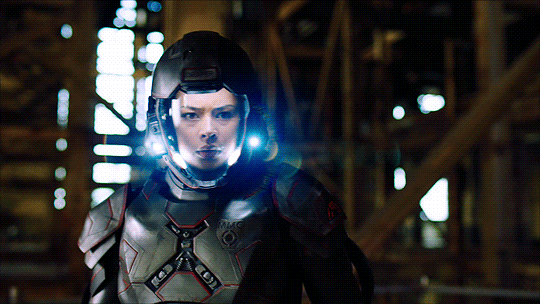
She, like some survivors of systematic abuse, is able to help others navigate through the challenges of finding oneself again thanks to her own experiences. This is especially seen in her friendship with Hunter in Far Past the Ring, whose own trauma comes out in painful paranoia, anxiety, and rage that almost destroys everything he loves.
When common grounds are found, and alliances are made, a powerful voice of continuity and fortitude can be forged. With that, challenges, enemies can be fought, battled, and won. With friendship and the strength of rebuilding and reconnecting with culture–and respecting those of indigenous people–we can move forward.
We are all related.
I wrote all of this on the eve of September 30th, the National Day for Truth and Reconciliation in Canada, the country that brought us The Expanse.

(Taken from National Day for Truth and Reconciliation and Orange Shirt Day - Waterloo Region District School Board (Waterloo Region District School Board)
This day is to commemorate the thousands of children of indigenous heritage who were taken from their homes, stripped of their culture and heritage. Many of them never came back to their families and homes. Thousands died.
It is only in recent history that this is acknowledged.
Similar instances also occurred in the United States, Australia, and countless other nations where indigenous people and their cultures were seen as an alien threat. They were not seen as fellow men, but as a part of the land that needed to be eradicated, controlled, and wiped out.
But survival happened. Still happens.
I hope that is reflected here, in a fictional story about the future…where the descendants of indigenous people use their skills and culture to push their people forward in our solar system.
Who forge friendships and alliances, who work to heal their trauma with the strength of their fellow man.
Who work together to stop a terrible empire from destroying their home.
I am a settler in the United States on the shores of Michigami, but I am a firm believer that the future of humanity lies within indigeneity. We will not reach the stars without it.
I have humbly done my best to reflect that in this story.
Miigwich.
More information can be found here:
National Day of Truth and Reconciliation: https://www.canada.ca/en/canadian-heritage/campaigns/national-day-truth-reconciliation.html
James Vukelich’s website: https://www.jamesvukelich.com/
Ojibwe Rosetta Stone: https://www.culture.aanji.org/language/ojibwe-rosetta-stone/
*=I use both terms here, as the Ojibwe/Anishinaabe people, as well as the Metis, are located in both the United States and Canada. Cara Gee herself is Canadian.
#indigenous#first nations#native american#national day of truth and reconciliation#michigami#ojibwe#orange shirt day#canada#great lakes#the clone wars#the expanse#the bad batch#fanfiction#crossover fanfiction#indigenous languages#tech x sjael drummer
19 notes
·
View notes
Text
[Phyllis] Webstad is the creator of Orange Shirt Day, a grassroots movement that turned global a few years ago to commemorate the residential school experience and honour survivors. Since September 2019, she had been touring schools across the country to share her own experience attending residential school and the importance of Orange Shirt Day…
From 1831 to 1996, over 130 federally funded, church-run residential schools were attended by more than 150,000 Indigenous children. The goal, as Canada’s first prime minister, John A. Macdonald, so succinctly put it, was to “take the Indian out of the child,” or forced assimilation. It was a cultural genocide that has reverberated through generations of Indigenous Peoples through intergenerational trauma. Stories stolen, stories lost, stories too horrific to tell.
#truth and reconciliation#national day of truth and reconciliation#orange shirt day#September 30th#September 30
15 notes
·
View notes
Text
In honour of the national day of Truth and Reconciliation,
Thank you to all the indigenous folk who worked on the Transformers IP
Thank you to all the indigenous artists, writers, and creatures that create the content we love
May your work be seen, recognized, and remembered.
And for our non-indigenous folk, listen and learn. Support those local to you. Whether it be a business, an elder, or a musician.
Tagging Indigenous Creators, feel free to tag someone!!
@wifecreature
#national day of truth and reconciliation#indigenous#native#transformers#maccadam#First Nations#Canada#ghost talks#support small business#tf
11 notes
·
View notes
Video
youtube
I am going to Geneva, and I suppose many stones have been placed in my path. But I must go there because your Imperial Government refused to keep good the British Crown’s promise of protection, pledged not only by Royal document delivered to Captain Brant, which we hold, but under the old covenant chain of friendship that Sir William Johnson and Captain Brant kept bright so long. Our document reads that the Six Nations, as the King’s faithful allies, may settle upon the Grand River lands as a safe retreat under his protection for them and their posterity forever. [...] We deny that such responsibility could be transferred to the Dominion of Canada without our consent, and we never consented. Our memory is not short.
Deskaheh, I Am Going to Geneva
[...] nous avons précisément choisi de parler de cette sorte de table rase qui définit au départ toute décolonisation. Son importance inhabituelle est qu'elle constitue, dès le premier jour, la revendication minimum du colonisé. À vrai dire, la preuve du succès réside dans un panorama social changé de fond en comble. L'importance extraordinaire de ce changement est qu'il est voulu, réclamé, exigé. La nécessité de ce changement existe à l'état brut, impétueux et contraignant, dans la conscience et dans la vie des hommes et des femmes colonisés.
Frantz Fanon, Les damnés de la terre
The third notion of “reconciliation” commonly invoked in the Canadian context refers to the process by which things are brought “to agreement, concord, or harmony; the fact of being made consistent or compatible.” As Anishinaabe political philosopher Dale Turner’s recent work reminds us, this third form of reconciliation—the act of rendering things consistent—is the one that lies at the core of Canada’s legal and political understanding of term: namely, rendering consistent Indigenous assertions of nationhood with the state’s unilateral assertion of sovereignty over Native peoples’ lands and populations. It is the state’s attempt to impose this third understanding of reconciliation on the institutional and discursive field of Indigenous–non-Indigenous relations that is effectively undermining the realization of the previous two forms of reconciliation. [ 1) "the diversity of individual or collective practices that Indigenous people undertake to reestablish a positive 'relation-to-self' in situations where this relation has been damaged or distorted by some form of symbolic or structural violence." 2) "the act of restoring estranged or damaged social and political relationships." ]
Glen Sean Coulthard, Red Skin, White Masks
#this is not really intended to be a representative selection it's just the stuff that I'm more familiar#with and thinking about today#national day of truth and reconciliation#as hollow as that rings given the ongoing actions of the canadian state and the provinces
9 notes
·
View notes
Photo


Another collaboration with @leading_edge_promo, this time for Orange Shirt Day 2022, which is also the National Day for Truth and Reconciliation. I chose to illustrate a cub paw within an adult bear paw as if they are holding hands. This symbolizes protection, support, and love. This year a portion of the proceeds will be donated to @nctr_um.
Think about what it means to be wearing orange on this day and remember that Truth and Reconciliation isn't just for one day, it's every day.
Fringe earrings by Mel Mckay at Blue Sky Eagle Woman Beading.
#bear paw#orange shirt#reconciliation#orange shirt day#every child matters#indigenous art#native art#why we wear orange#national day of truth and reconciliation#truth and reconciliation#be the change#indigenous#artist#frettchanstudios#first nations#nisgaa#metis
15 notes
·
View notes
Text
Lunch by Chef Shawn Adler of Lac des Mille Lacs First Nation
For the inaugural post of this blog, I was very fortunate to have a delicious lunch provided with a dreamcatcher event at work as part of National Day for Truth and Reconciliation celebrations. It was a bit early this year, due to the timing of the official date (Sep 30) falling on a weekend.

The lunch consisted of:
A lovely, mixed greens salad in veggie ribbons, flowers and bean sprouts with an apple-honey vinaigrette
Jumbo Bison, smoked Ontario cheddar meatballs in a sage-cedar jus
Ontario corn succotash with squash and beans (3 sisters)
Wild rice pilaf with mushrooms, kale and pumpkin seeds
Sour cherry cornbread trifle
Wilds Soda Company Sodas in cedar and sweetgrass flavours
The wild rice pilaf was incredible, lots of depth and interesting flavours. The cornbread trifle was also wonderful, the flavour combination was not overly sweet and refreshing.
The chef is also the owner of owner of The Flying Chestnut Kitchen and Pow Wow Café. You can learn more about Anishinaabe chef Shawn Adler at CBC Gem. Follow Anishinaabe chef Shawn Adler into nature as he forages for unique wild foods that grow all around us. From wild ginger to burdock root, Shawn explores — and cooks with — hidden delights that can be found across Canada in each season of the year.
We also had the privilege to attend an interactive session led by William Morin, an educator and cultural consultant with Ojibway/Scottish/French Canadian heritage, introducing the Truth and Reconciliation Commission (TRC). Participants will sit in a circle, forming a dream catcher's hoop as it's woven. Morin will interweave teachings of the TRC, Medicine Wheel, Turtle Island, Moon Time, and their connections. With over 25 years of experience, he's taught Indigenous Studies and Anishinaabe Language Fundamentals at institutions such as the University of Sudbury, Laurentian University, McEwan School of Architecture, and Sudbury Catholic District School Board, enriching this unique experience. The session was powerful and memorable, and taught the importance of empathy, listening and creating healing of trauma.
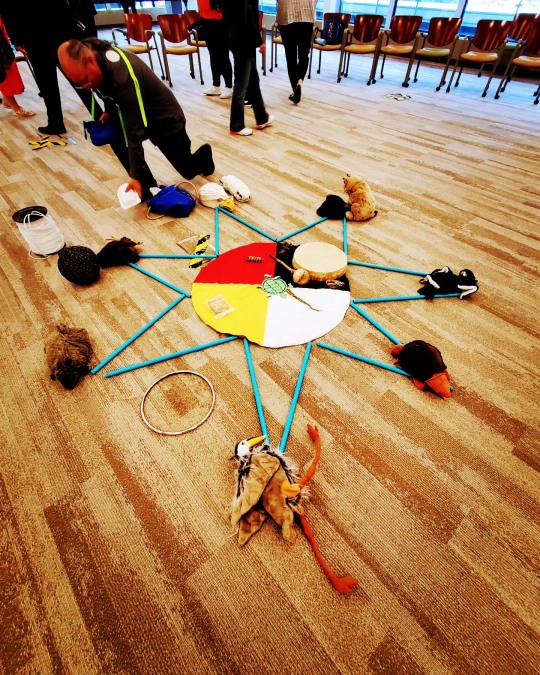
1 note
·
View note
Text
- september 30th, national day for truth and reconciliation -
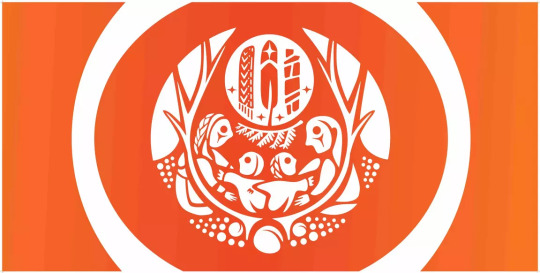

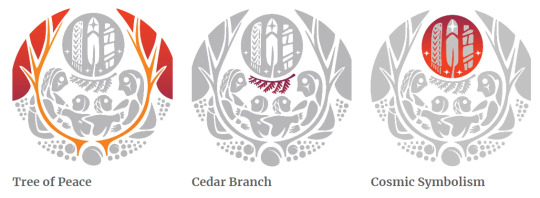

Survivors experienced horrific atrocities while prisoners in these institutions. It is important that this image show the love and strength that colonialism tried to steal from us. Despite genocide, we are still here – still fighting for justice and restitution, as true Warriors. - Dorene Bernard, Mi’kmaq Survivor who attended Shubenacadie Residential School
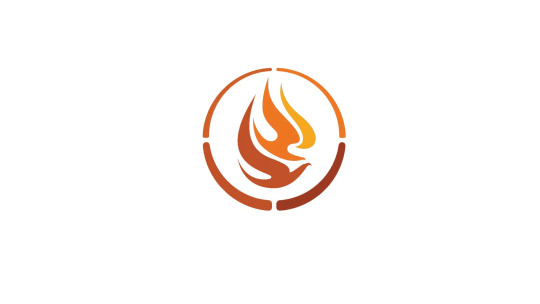
#chromatic voice#national day for truth and reconciliation#first nations#inuit#metis#missing and murdered indigenous women#mmiwcanada#residential schools#indigenous#turtle island#unceded land#survivor testimony#orange shirt day
317 notes
·
View notes
Text
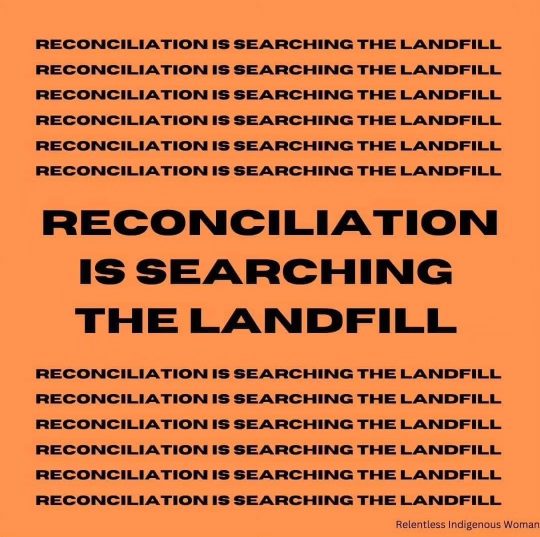
relentless_indig_woman
[IMAGE ID: an orange background with black text reading 'Reconciliation is searching the landfill' written repeatedly. IMAGE ID END]
*if you like this post instead of reblogging, I will block you. this is about indigenous women's lives and not just a fun post to put in your likes*
#reblog this don't just like#mmiwg2s#truth and reconciliation#ndn#reconciliation is dead#first nations#indigenous#canada#orange shirt day
141 notes
·
View notes